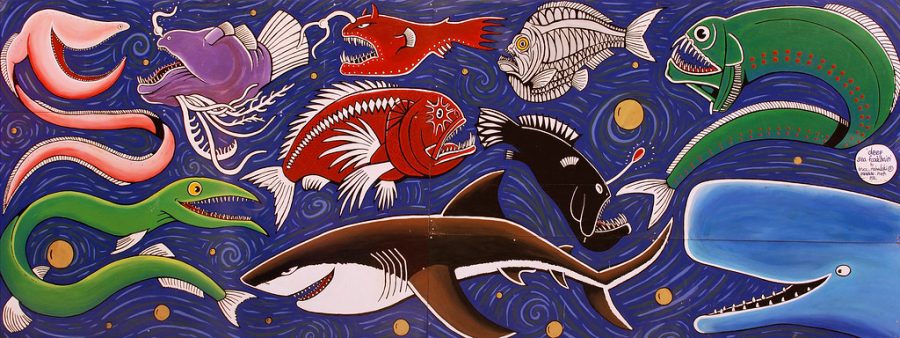Alvin- Exploring the Ocean at 21,000 Feet
“Deep Sea Food Chain – Bruce Mahalski” is licensed under CC BY-NC-ND 2.0
Alvin, the Woods Hole Oceanographic Institutes’ (WHOI) premiere submersible, is being remodeled to reach 6,500 meters deep. Alvin lets scientists reach new depths with ocean exploration.
“The new Alvin will enable our users to visit unexplored places, never before seen deep sea habitats, and more importantly, it’ll ensure that the newest generation of scientists and young explorers have the necessary tools to make these discoveries in the deep sea,” WHOI Alvin programmer and Chief Pilot Bruce Strickrott said.
Alvin helps volcanologists like Patricia Gregg discover underwater volcanoes and gather information on preexisting underwater volcanoes. Gregg has high hopes that Alvin’s modifications will allow for more underwater ranges to be found.
“Going to deeper parts of the ocean will let us explore more volcanoes. With the previous Alvin we could go down 4500 meters, but there are smaller volcanoes in deeper parts of the ocean that we’ve never visited and never been able to explore,” Gregg said, “Our current view of volcanoes is focused on ones that are in a certain range of depths, but what about all of those others that are much deeper? Maybe they’re different, maybe there are different biological communities on them, maybe there’s a difference in how they morphologically grow and evolve, but we don’t know because we haven’t visited them, so I’m looking forward to being able to propose sites that we otherwise would not have been able to visit.”
In addition to its usefulness with volcanic exploration, Alvin is also a major resource for biologists studying deep sea ecosystems. The submersible has already played a role in discovering hundreds of new species, and the remodeling will allow biologists to find more.
“When Alvin gets its upgrade to allow it deeper, it should have access to almost the entire ocean floor, only a few spots will be out of range, and I would expect those dives to result in lots of new discoveries. Right now is truly a new age of discovery in the ocean – we finally have the technology to explore the deepest parts of the ocean and new species are being discovered on every expedition. So Alvin won’t be the first to explore those depths, but it will be the first to bring people that deep to do science,” Marine biology teacher Jeff Colborn said.
Although there are other remotely controlled submersibles, many agree that being able to see the ocean depths is irreplaceable and like no other experience. Being in Alvin allows researchers and scientists to secure samples and study marine life and ecosystems up close and accurately.
“I can tell you that, as a person who studies animals, going in Alvin and seeing the animals with my own eyes, is a game changer,” Marine biologist Peter Girguis said, “It’s vehicles like Alvin that gives us an opportunity to experience the deep sea firsthand by diving, and it’s with our eyes that we can best comprehend that environment.”









